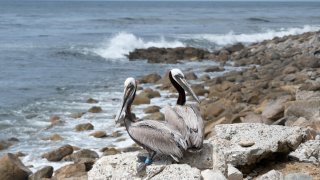
The bird, nicknamed Blue, spread her wings and took flight to join other pelicans at White Point Park Thursday morning.
A Brown Pelican that was found in San Pedro with a slashed pouch was released back into the wild in San Pedro Thursday after undergoing weeks of treatment and receiving more than 500 stitches.
The bird, nicknamed Blue, spread her wings and took flight to join other pelicans at White Point Park Thursday morning. Russ Curtis, from the nonprofit International Bird Rescue, said visitors often see other pelicans roosting or just hanging out at the park, which will make it easier for Blue to rejoin them in the wild.
The bird was brought to the care center in San Pedro on March 10 after being found with its pouch severed from the base to the tip on both sides -- injuries that are believed to have been human-caused.
Curtis noted Blue healed pretty quickly after undergoing two surgeries. Blue required about 500 stitches to reconnect her pouch to her mouth.
Get Southern California news, weather forecasts and entertainment stories to your inbox. Sign up for NBC LA newsletters.
"Pelicans are pretty resilient, especially if we get them in early and get them hydrated,'' Curtis said. "We were able to put some sutures into her pretty quickly, so she could start to eat again. We did a second surgery to clean it up a little bit.''
Curtis noted that she started eating immediately, and if she hadn't been brought in when she was, Blue wouldn't have made it in the wild. The 3-year-old pelican was nicknamed Blue in honor of a similarly injured pelican that was treated at the center a decade ago named Pink, who required about 600 stitches.
"We believe these are human caused. Evidence from the folks who did the surgery and looked at the pouch laceration said the way it was cut -- it looks like somebody was malicious and did this horrible act,'' Curtis said.
He said that often times the center rescues pelicans with injuries or tears caused by fishing lines, but Blue's injury was too significant to have been caused without some sort of human interaction.
Curtis expressed his gratitude for the person who noticed Blue and brought the pelican in.
"Let's be more mindful around wildlife. We need to share our space with wildlife,'' Curtis said. "They're a big part of what makes life on Earth a little bit easier for all of us. Seeing those squadrons of pelicans, flying right at the wavelength, especially around sunset, it's a very meditative thing.''
He added, "I think people should appreciate these birds. They are so majestic and they're the closest thing I see to what we would consider almost flying dinosaurs.''
Anyone who might have information about the attack on the pelican to call the Cal Tip Line at 888-334-2258.
The nonprofit wildlife organization relies on public support to help fund the care of injured, sick and orphaned waterbirds. Donations may be sent to www.birdrescue.org/donate/.